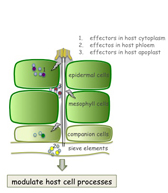Aphids are sap-feeding insects that induce extensive feeding damage, achieve high population densities and transmit economically important plant diseases worldwide. These insects cause significant economic losses in staple food and bioenergy crops, including potato, soybean, cereals, and oilseed rape.
Like most plant parasites, aphids require intimate associations with their hosts to gain access to nutrients. Aphids have specialised mouthparts, stylets, which they use to probe different plant cell types, and to feed on plant sap in the plant vascular system. Aphid salivary proteins have been implicated in suppression of plant defences. Furthermore, some aphid species perturb plant developmental processes by, for example, inducing leaf curling or the formation of galls. Suppression of plant defences and altering host physiology is common among plant pathogens and generally involves the secretion of pathogen molecules, or effectors, into host plants that manipulate plant cellular processes.

Recent evidence suggests that aphids, like other plant parasites, secrete effectors that share functional features with plant pathogen effectors. An understanding of the plant cellular processes targeted by aphids and the effectors required for parasitism will facilitate the development of novel and sustainable aphid control strategies to increase crop yield and reduce pesticide usage.
